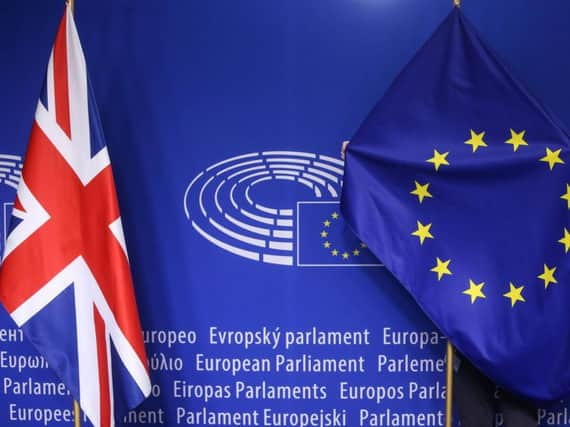Everything you need to know about the European Parliament elections in Northamptonshire in May 2019


As the Brexit deadlock continues, the preparations have taken place for the elections at the end of May - though Prime Minister Theresa May is still seeking a way to leave the EU before the vote takes place.
Should, as predicted, the election go ahead, then it will be the only time this year that Northamptonshire residents will head to the ballot box for an election. Local council elections have been postponed in the county for May 2 due to the expectation of two new unitary authority councils being created for 2020, but Brexit has also led to delays in kick-starting that process.So here’s a rundown of everything you need to know about the European Parliament election in Northampton and the candidates that are standing.
When is the election?
Advertisement
Hide AdAdvertisement
Hide AdThe election takes place on Thursday, May 23. Residents can vote between 7am and 10pm. However, the election will be postponed if the UK leaves the European Union before that date.
Where can I vote?
Locations for polling stations will be included on your polling card. Alternatively, you may already have been sent a polling card through your letterbox if you are registered for a postal vote.
What is the European Parliament?
The European Union is made up of three institutions: the parliament, the council and the commission.
These upcoming elections are for the Parliament, which is the only one of the three to be directly elected. It is made up of hundreds of MEPs elected by constituents across the continent, with the number of MEPs each country has being proportionate to its population.
Advertisement
Hide AdAdvertisement
Hide AdIt also scrutinises the work of the commission - as well as approving its president - and helps set up and ultimately passes the EU budget.
The commission acts as the executive of the European Union, and is made up of 21 commissioners representing each member state. Jean-Claude Juncker is the President of the Commission. The current commissioner for the UK is Julian King, who was appointed by David Cameron back when he was Prime Minister in 2016. The Commission’s role is to draw up proposals for new legislation, which will then be discussed by the parliament.
The council is made up of relevant ministers and portfolio holders from each country depending on what the agenda item is.
What will you be voting for?
Because of the size of the EU, the MEPs stand in much larger constituencies than in the UK. Therefore, Northampton doesn’t have its own MEP. Instead, you will be voting for MEPs to represent the East Midlands region, along with residents from Derbyshire, Nottinghamshire, Leicestershire, Rutland and most of Lincolnshire. The East Midlands region elects five MEPs to the European Parliament.
How does the vote work?
Advertisement
Hide AdAdvertisement
Hide AdElections for the European Parliament use a different kind of voting system than the one we use in our general elections in the UK. In the 2017 General Election, for example, you voted for one candidate only in the First Past The Post electoral system, and the candidate with the most votes was elected.
The European Parliament elections uses a ‘Closed Party List’ system, where you vote for the party instead of the candidate. Once the ballot papers have been counted, each party gets the number of seats proportionate to the number of votes it has received in each constituency.
Each of the parties in the East Midlands has nominated five candidates, and will have ranked them in order of which ones they want elected. So if one party receives 40 per cent of the vote, they would get two MEPs, and the first two of the five listed will be elected, but the other three won’t be. The parties determine the order in which candidates appear on the list and are then elected.
Which parties are standing in the East Midlands?
This election, should it take place, will have an interesting dynamic as there are two new political parties standing candidates for the first time. Change UK (formerly known as The Independent Group) was formed in February after a number of Labour and Conservative MPs decided to leave their party.
Advertisement
Hide AdAdvertisement
Hide AdThe Brexit Party was formed by Nigel Farage in January, and has a host of MEPs who have defected from Mr Farage’s former party UKIP. The elections will see old versus new, with both parties standing candidates.
The Conservatives, Labour, Liberal Democrats and Green Party are all standing as usual, while there are a number of Independent candidates also standing as part of the Independent Network, and a solitary independent candidate standing on his own platform.
Who are the candidates?
Change UK - The Independent Group
1) Kate Godfrey
2) Joan Laplana
3) Narinder Sharma
4) Pankajkumar Gulab
5) Emma Manley
Conservative
1) Emma McClarkin
2) Rupert Matthews
3) Tony Harper
4) Brendan Clarke-Smith
5) Thomas Randall
Green Party
1) Kat Boettge
2) Gerhard Lohmann-Bond
3) Liam McClelland
4) Daniel Wimberley
5) Simon Tooke
Independent Network
1) Nick Byatt
2) Marianne Overton
3) Daniel Simpson
4) Pearl Clarke
5) Nikki Dillon
Labour
1) Rory Palmer
2) Leonie Mathers
3) Tony Tinley
4) Nicolle Ndiweni
5) Gary Godden
Liberal Democrats
1) William Newton Dunn
2) Michael Mullaney
3) Lucy Care
4) Suzanna Austin
5) Caroline Kenyon
The Brexit Party
1) Annunziata Rees-Mogg
2) Jonathan Bullock
3) Matthew Patten
4) Tracy Knowles
5) Anna Bailey
UK Independence Party (UKIP)
1) Alan Graves
2) Marietta King
3) Anil Bhatti
4) Fran Loi
5) John Evans
Independent candidates
1) Simon Rood